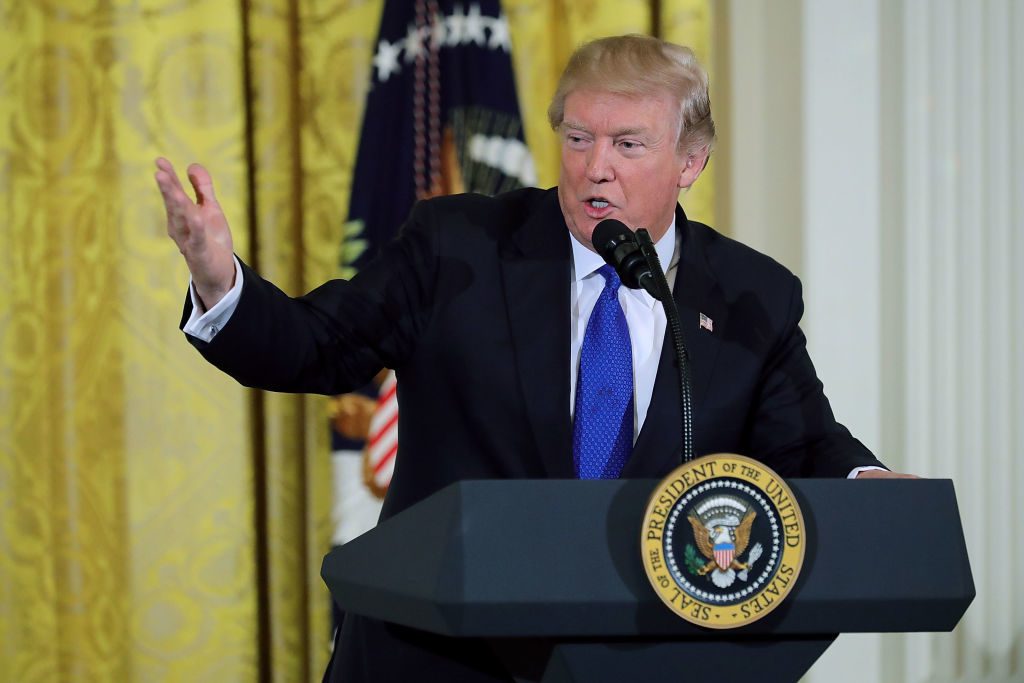
Despite economic growth and full employment, U.S. business leaders again have mixed feelings about President Trump. President Obama did not enjoy warm personal relations with most CEOs, and his predecessors had selectively comfortable relations. After major business leaders reneged on a labor agreement he brokered, President Kennedy retorted, “My father warned me you guys are all SOBs!” President Eisenhower enjoyed a better relationship with big business, but he worried about the agenda of “the military-industrial complex.” President Nixon was thought to be too close to some big businesses such as Chiquita and ITT, with devastating impact on Latin America. Herbert Hoover was a mining consultant, and Harry Truman was a small haberdasher. With Trump as our first true CEO President, it was presumed the White House’s big business relationship would be a lot better than things are going these days.
CEO confidence has plunged doubled digits this year in Chief Executive’s recent survey, falling another six percent in August. Erratic pronouncements are not the way most non-Elon Musk CEOs lead. While the majority of major CEOs vote Republican, they did not support Trump. They liked the tax cuts and regulatory rollbacks but have had problems with the social divisiveness and mercurial management. Eighty percent of CEOs report that they are embarrassed about Trump’s global diplomacy and fear national security has been weakened by attacks on allies. Many were shocked by last week’s tweeted proclamation from President Trump that they are “hereby ordered to immediately start looking for alternatives to China…” However, many business leaders shrugged it off, and others were shocked when he fortified it a day later.
CEOs chafed over the weekend with Trump’s invocation of the peacetime International Emergency Economic Powers Act of 1977, which is intended to protect us from terrorists and wartime and can be triggered in an economic crisis at “Presidential discretion.” There was historic justification for such actions as Chase Manhattan, Exxon, Texaco and Chevron continued to work with Nazi Germany even after war was declared, a violation of the 1917 (renewed in 1933) Trading with the Enemy Act. Thus, Trump might be able to beat judicial challenges in his efforts to block imports and exports, freeze Chinese assets in the U.S. and stifle U.S. investment in China.
What makes this situation even more complex is there is widespread support for Trump’s effectiveness in getting the conflict aired. Long fearful over retribution, Chinese business leaders regularly complained quietly over unfair Chinese trade practices. Despite decades of unfair Chinese trade practices regarding intellectual property theft, forced technology transfers and imposed majority ownership in larger businesses, few U.S. business leaders spoke out in complaint during the Bush and Obama years. Under Trump, there is open support for tariffs. Approximately 75% of U.S. firms believe they have been treated unfairly in China. This time last year, 30 percent of U.S. firms were looking to source manufacturing outside of China. Now, that number has grown to almost half of U.S. firms.
But while many CEOs privately agreed that something needed to be done, they were caught unprepared for so sudden a transition. China provides one-fourth of the world’s manufacturing output. Depending upon the industry, U.S. business leaders are very dependent upon Chinese supply chains, lower costs and efficient infrastructure. In addition, the growing market of middle-class Chinese consumers is larger than the entire U.S. population. What doesn’t help are the assaults on key global allies needed to reinforce share fate positions, the whiplash presidential flips within 24 hours on the state of the economy, positions on trade sanctions, tax cuts, troop withdrawals, the truth over his absence from part of the G-7 meetings, misleading statements over China’s present lack of outreach to him and a continuing series of personally vindictive attacks on those with policy differences such as with his hand-chosen cabinet officials and Federal Reserve chair.
I have known and critiqued Donald Trump’s leadership style longer than virtually any management scholar. In 2004, I wrote a series of op-eds, at the request of NBC, commenting on the presumed lessons of The Apprentice. In one such column for The Wall Street Journal, entitled “The Last Emperor,” I revealed his core endorsed leadership devices:
“Rather than show inspirational team leadership and the building of coherent cultures, ‘The Apprentice’ teams are designed as circular firing squads—hardly the staffing pattern of an enduring enterprise. The selection process resembles a game of musical chairs at a Hooters restaurant where sexual baiting and pleading is confused with effective salesmanship. The assigned team-projects neglect the core functions of leadership, such as integrity, invention and inspiration. No new goods or services are created, no business innovations surface and no societal problems are solved. Instead, we see people hawking sex, clothes, booze, water, bags of dirt, more sex and celebrity access.”
In cracking Trump’s “reality TV” featured modus operandi of insults, deceptive practices and divide-and-conquer maneuvers built into the elimination game design, NBC and Trump quickly regretted my assignment. However, when Trump switched from threats and instead tried to set up a friendly lunch, I offered an alternative format. Instead of enlisting engaging young professionals as role models for this slugfest, I suggested fallen and even reviled celebrities, and he morphed the show into Celebrity Apprentice, muting my criticism. At that point, we became genuine friends—and he offered me the first presidency of Trump University, which I fortunately declined.
In 2005, I welcomed Citizen Trump to one of our Yale Summits. Several of the CEOs of the nation’s largest enterprises warned me seeing his name on the program that if Trump arrived, they were exiting. True to their word, when he arrived, many departed. I reminded Trump of this in 2017, as he noted several of these same CEOs were now racing to see him. He was not the CEO of a major global enterprise, and he resented not being accepted by their club.
I was also the first in print to predict his election victories back in 2015 in a Fortune piece entitled, “Why the Dump Trump Effort Will Fail.” At a salon-style dinner hosted by one of Trump’s current top White House advisors, who was then a skeptic, another top current White House advisor stood and declared, “As an expert on women’s voting behavior, I can assure a school teacher like you that Donald Trump will never gain 2 percent of Republican women voters.” I countered that Trump was touching on several salient qualities in the American electorate that the pundits were missing beyond the exploitation of racial tensions alone. In his exclusive first print interview as a candidate in 2015, entitled “Donald Trump Tells Sonnenfeld Why he Should be President.” Trump spoke with me as if he might pivot to the center. Some of his early appointments were alarming, and some very reassuring.
Trump’s friends and adversaries were wrong then and are wrong now. Trump hates multilateral agreements from the UN, NATO, TPP and the G-7. The divide-and-conquer one-offs as rewarded in The Apprentice got him through the primary and general election and then gutted public criticism from Republican legislatures once in office. Business leaders were surprised when he set up public contests in his first few months in office between Boeing and Lockheed; GM and Ford; Pfizer and Merck, etc. If business leaders want to challenge him, they have two options:
He has obvious hair-trigger resentment at public criticism, which he finds to be personally insulting. They can appeal to him privately the way Steve Schwarzman of Blackstone, Ginni Rometty of IBM, Jamie Dimon of JP Morgan, Marillyn Hewson of Lockheed Martin and Tim Cook have done—effectively with respectful private personal discussions. Trump is a bad reader but often a good listener; yet, however persuaded he may be to sound reasoning and evidence, he can be swayed by the next White House visitor who champions a reverse path to expediency and power.
The other option is collective action, as when the U.S. big business community walked out in unison, following the bold Ken Frasier of Merck’s lead in reaction to Trump’s mishandling of the Charlottesville white power violence. This was the first time in American history the U.S. business community rejected a call to service by a President. Their success was in their unity. Trump respects strength. If they take the path of throwing a stone at an emperor, they must be unified to hit the target.
When it comes to China, if they have strong sentiment about unfair trading practices but see the tariff approach ineffective, they must rally around an alternative. Just as individual business leaders were largely afraid to speak out alone for fear of China’s vindictiveness, individual U.S. business leaders are afraid to publicly challenge misguided national leadership back home with the same fear. However, as Benjamin Franklin admonished his fellow nation builders, “If we do not hang together, we will surely hang separately.”

Chief Executive Group exists to improve the performance of U.S. CEOs, senior executives and public-company directors, helping you grow your companies, build your communities and strengthen society. Learn more at chiefexecutivegroup.com.
0

1:00 - 5:00 pm
Over 70% of Executives Surveyed Agree: Many Strategic Planning Efforts Lack Systematic Approach Tips for Enhancing Your Strategic Planning Process
Executives expressed frustration with their current strategic planning process. Issues include:
Steve Rutan and Denise Harrison have put together an afternoon workshop that will provide the tools you need to address these concerns. They have worked with hundreds of executives to develop a systematic approach that will enable your team to make better decisions during strategic planning. Steve and Denise will walk you through exercises for prioritizing your lists and steps that will reset and reinvigorate your process. This will be a hands-on workshop that will enable you to think about your business as you use the tools that are being presented. If you are ready for a Strategic Planning tune-up, select this workshop in your registration form. The additional fee of $695 will be added to your total.

2:00 - 5:00 pm
Female leaders face the same issues all leaders do, but they often face additional challenges too. In this peer session, we will facilitate a discussion of best practices and how to overcome common barriers to help women leaders be more effective within and outside their organizations.
Limited space available.

10:30 - 5:00 pm
General’s Retreat at Hermitage Golf Course
Sponsored by UBS
General’s Retreat, built in 1986 with architect Gary Roger Baird, has been voted the “Best Golf Course in Nashville” and is a “must play” when visiting the Nashville, Tennessee area. With the beautiful setting along the Cumberland River, golfers of all capabilities will thoroughly enjoy the golf, scenery and hospitality.
The golf outing fee includes transportation to and from the hotel, greens/cart fees, use of practice facilities, and boxed lunch. The bus will leave the hotel at 10:30 am for a noon shotgun start and return to the hotel after the cocktail reception following the completion of the round.